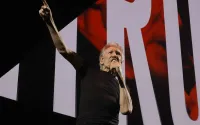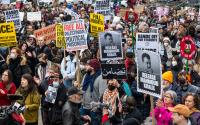Let the numbers battle begin. The first unofficial police estimate of yesterday's mega-march in New York: 120,000. The organizers' estimate: 400,000. The earliest news pieces used the usual vague "tens of thousands" or "more than 100,000," but the Washington Post wrote of "more than 200,000," and the usually march-unresponsive New York Times picked the phrase, "hundreds of thousands." So the choice is yours.
On a boiling hot late August day, on the eve of the Republican Convention, 100,000/200,000/400,000/500,000 upset, angry, anybody-but-Bush marchers (with the odd Green Party or Naderite supporter thrown in), walked up Manhattan's Seventh Avenue, doing for small businesses -- delis, corner groceries, Tasti-Freezes -- what several thousand Republican delegates and the massed imperial media will do only for a few fancy hotels, posh restaurants, and theaters. There was a rush on bottled water, on in fact almost anything drinkable, and at one point when the well-branded Fuji surveillance blimp, stamped with an NYPD [New York Police Department] logo passed overhead, blocking the fierce sun and throwing a shadow on the crowd below, a cheer went up from the massed marchers on their way to nowhere in particular (having been denied a permit to rally in Central Park).
The antiwar, anti-Bush movement, which had disappeared from New York's streets after a final massive but depressed demonstration with the war already underway in April 2003, was back -- and the mood was different indeed. Gone was the carnival atmosphere of early antiwar marches. The hand-made signs were still there, and some of them were still funny or clever ("Kerry dodged bullets, Bush dodged the war, Rove calls the shots" or "Back by popular demand" next to a peace sign), but most of them caught the essence of the moment: They were angry ("Worst President Ever," "Stop Mad Cowboy Disease"), even outraged ("War Monger, War Criminal," "No one died when Clinton lied. F--- Bush," "How many people must die for ‘your mission' to be accomplished" [with the quote marks as drops of blood]). And the single most omnipresent word in all its various forms on people's lips, and on their signs, was "lie" ("lying," "liar") -- "Bush lies, who dies?" "The war on terror is a lie," "Liars, thieves, murderers," "George Bush, 971 Dead… and still lying" -- while Bush (Rumsfeld, Cheney, Ashcroft) photos, masks, and puppets all had noses that would have made Pinocchio blush.
Given the months of intimidation -- the Bush administration Code Orange alert, the endless discussions of possible terrorist acts, the hair-raising statements of Mayor Bloomberg and Governor Pataki, the highly publicized showing off of new police weaponry and tactics of a sort fit for a police state, the regular labeling of the New York Police Department as larger than all but 19 militaries in the world, the rumors that the world's most dangerous anarchists were headed our way, and so on -- given the attempts, that is, to scare protestors out of town, this was a march you had to think about. You had to make a decision to attend. You had to have a reason (or multiple reasons) for coming. When asked, marchers tended to stress the "seriousness" of the moment and to suggest a sense of being at the edge of a volcano.
It was hardly an up crowd, but it was certainly a determined one. When, right in front of Madison Square Garden where the convention was scheduled to begin the next day, a giant, papier-mâché green dragon was doused with gasoline and set on fire, perhaps by the small group that had been inside it -- a dangerous and malicious act -- and police on motorcycles, horses, and scooters as well as on foot with billy clubs at the ready and plastic handcuffs in quantity attached to their pants' legs, promptly closed in, shut the march down, made a few arrests, and looked ready to end things right there, a man near me exclaimed, "This election is the end. It's the last one. I don't think we can survive this election!" But the marchers, who had not already passed the Garden, waited with determination until, to shouts from the sidewalks of "Whose streets! Our Streets!" the police moved aside. Then they simply marched on.
With hovering helicopters, serried ranks of police, and visible police dogs (which, I have to admit, brought to mind Abu Ghraib), not to speak of that Fuji blimp shadowing the march from beginning to end, you could sense how blurred the distinction between dissent and terror was becoming. Dissent is now something that, by definition, should take place in penned-in locations between lines of militarized police. While many protestors were clearly driven to the march by the war in Iraq (and other Bush administration horrors), fears of loss of liberties were also a powerful motivator. Marchers -- at least those I talked with -- almost uniformly felt that their presence was a statement in favor of the very existence of civil liberties. I was struck as well by how many people made the decision to come in the face of a sense of intimidation and how many were willing to travel sometimes surprising distances to attend. In the course of perhaps six hours on my feet (from the first gathering moments downtown until I peeled off at 34th street and Broadway and headed for Central Park), I did my best to talk to as many people as possibly in a crowd that, though predominantly white and young, was nothing if not varied.
Tomgram: Jonathan Schell on our failed imperium
Last week, Jonathan Schell and I exchanged letters on the nature of the American empire, based in part on his analysis, in his book The Unconquerable World, of three centuries of armed as well as unarmed resistance to various imperial urges by the peoples of our planet. Now, he has taken up the subject of imperial America again in his latest "Letter from Ground Zero" in this week's issue of the Nation, which the editors of that magazine are kindly letting me share with you below. Considering that piece a kind of third letter in our series (and given the fact he and I continue to chat about imperial subjects), I've responded with a letter of my own. Tom
Imperialism without Empire
By Jonathan SchellIs the United States -- as so many have said, in celebration or dismay -- a planet-mastering empire or not? The question presses upon us as George W. Bush gets ready to descend upon New York for the Republican convention, as he once descended upon the aircraft carrier Abraham Lincoln under the banner declaring "mission accomplished" in Iraq.
Just as the President's landing on the Lincoln invited an assessment of the Iraq war, so now his visit to New York invites assessment of the larger, global mission of the administration. (And, come to think of it, Manhattan Island, with its slim uptown and its broad-beamed downtown, is shaped rather like a gargantuan aircraft carrier.) The decision to hold the convention in New York City was apparently conceived as a triumphal return by the nation's savior to the scene of September 11. But the recent fortunes of the United States have been anything but triumphal. The President's policies have failed to check the proliferation of weapons of mass destruction. The entire "axis of evil," consisting, according to the President, of Iraq, Iran and North Korea, continues to defy his administration in one way or another. In Iraq, the Marines are now at war with the Shiite community the United States supposedly came to save. North Korea has allegedly become a nuclear power, and Iran seems to be heading that way. The traditional alliances of the United States have been shaken. After 9/11, editorialists asked, "Why do they hate us?" Whatever the reasons, "they" have multiplied to include most of the world.
In the face of so much failure, I wrote recently to my book editor and friend Tom Engelhardt, America's title to global empire seems at the very least in question. (This column does double duty as the third in an exchange of letters on the subject between me and Engelhardt at his superb website, tomdispatch.com, sponsored by the Nation Institute. The earlier letters can be read at the website under the August 2004 posts.) Engelhardt responded with an eloquent list of America's imperial assets, including, among other items, its 700-plus military bases, its supine Congress, its nearly half-trillion-dollar military establishment, its division of the Earth into five military commands, its ambition to dominate space and its militarized political parties.
So the answer to the question, "Is the United States a global imperial power?" must be an unequivocal yes. However, if the question is shifted very slightly, and we ask, "Is the United States a global empire?" the answer is less obvious. Bush's America plainly has global imperial ambition, but does it have the corresponding accomplishment?
Perhaps the question can be better addressed by dividing it into two parts: first, whether the United States has the wherewithal to play an imperial role, and, second, whether the world is ready to receive American imperial direction. Clearly, the world's will to resist is as notable as the U.S. will to impose itself. It's sometimes said that America is militarily strong but politically weak (and economically in a gray zone). Yet even the extent of U.S. military strength, often called unchallengeable, is open to question. The United States definitely has the largest heap of weaponry on the planet. But if, as the remarkable American failure to have its way with the "axis" countries suggests, that military punch cannot produce the desired results, then is it correct to speak so confidently of unlimited military "strength"?
Tomgram: Mike Davis on the Ghost Shirts
Redefinition lies at the heart of the world the Bush administration wants to create. After all, we now have a "sovereign Iraq" still occupied by 140,000 American troops and with every "ministry" stocked with its own genuine American advisor. Meanwhile, back home, those tax cuts the President pushed through are "leveling the playing field" for all Americans, or as George Bush put it recently at a training facility for carpenters in Las Vegas: "I also believe one of the reasons that we have overcome these obstacles [to better times] is because we provided well-timed tax relief to the small businesses and the workers of America. If a construction worker has got more money in his pocket, he's going to demand an additional good or a service…. That's how the economy works. That's why the tax relief was important."
Actually, here's how his tax cuts worked out: "The non-partisan Congressional Budget Office said one-third of the tax cuts had gone to the richest 1% of Americans, who earn an average of $1.2m a year. The average tax cut for them totaled $78,500. By contrast, those in the middle income bracket got a tax cut of $1,000 and the poorest fifth were doled out the majestic sum of $250 for the whole year." And then, of course, there's our "health-care president" on whose watch "the number of Americans without health insurance has climbed by 4 million, to nearly 44 million."
And now, more good redefinitional news. Thanks to a set of new federal guidelines on overtime work pushed through by the Bush administration, all sorts of people have automatically gained status in our society and can proudly call themselves "management" or "administration." As former Labor Secretary Robert Reich pointed out, "the rules redefine the term 'executive' to include manual workers who sometimes supervise two or three people. And, he says another one or two million 'team leaders' who don't supervise anyone will lose [overtime] eligibility by being reclassified as 'administrators.'" Of course, as bona fide members of the managing team, they no longer will be paid overtime wages for overtime work. But there's no gain without pain, is there?
Oh, and as for our "jobs president," I won't even mention the name Herbert Hoover. In fact, just don't get me started. Fortunately, I don't have to. Below, Mike Davis makes clear what's happening to working-class jobs in this country and, whatever the verbiage on the campaign trail this fall, how little anyone is doing to stop more of the same. Tom
The Ghost Shirts
By Mike DavisSeptember, 1, 1934: Millions of cotton spindles stopped spinning. Across the Southern Piedmont, mill whistles blew but workers didn't come to work. The most exploited industrial workforce in the United States – the "lint heads" of the Carolinas, Tennessee, Georgia, and Alabama – was on strike.
As mill owners appealed frantically for injunctions, tear gas, and the National Guard, a vast, peaceful army of textile workers demolished the image of Southern labor as culturally servile and unorganizable. With voices honed to spare beauty in the choirs of mountain Baptist churches, they sang, instead, powerful hymns of solidarity.
Unidentified Flying Words (UFWs) and other strange sightings
In the last couple of weeks, if you weren't ducking UFWs (Unidentified Flying Words), perhaps you were wishing you could be transported to Roswell, New Mexico, or Nevada's infamous Area 51 where the strangest thing you might run into would be well-preserved, if spindly, alien bodies of a sort seen too regularly in the movies and on old episodes of The X-Files to hold any surprises for you. On the other hand, the rest of our world seemed an odd combination of a comedy of errors and alien terrors. Let me then just offer 9 recent strange sightings from our bizarro world.
1. The harmonics of civilization (foreign front): On August 8th, according to the BBC, "speaking to reporters in Najaf…, a heavily-guarded Mr. Allawi said there would be no negotiations with 'any militia that bears arms against Iraq and the Iraqi people. The outlaws have to lay down their weapons and leave the city's holy sites including the Imam Ali shrine."
From at least early August, our prime minister in Iraq, former Baathist Iyad Allawi, has been calling the [chose one: young/ambitious/anti-American/fiery/rogue/radical/renegade/rebel/populist] cleric Muqtada al-Sadr and his followers "outlaws." Strangely enough, so has our Secretary of State Colin Powell. It's lovely, isn't it, that Allawi and Powell not only see things in such an eye-to-eye way, but are coordinating in such a mouth-to-mouth manner, linguistically speaking. We know this is so, because translation from the Arabic never gets in the way. Allawi, a former exile who like many of his confreres in the "interim administration," has planted his roots abroad (not to speak of possessing a British passport), expresses himself regularly in English. In fact, as our nightly TV news so often makes clear, the PM gives numerous news conferences in English (as do others among his colleagues). This evidently seems so natural to our press corps in Baghdad that no one even thinks to comment on it. But for just a moment, imagine the unimaginable. The President of the United States steps to the podium to begin a White House press conference and launches into Arabic. Oh well, I know it's too ridiculous to consider. But it certainly tells us something about where Allawi's prime audience lies and where he is trying hardest to solidify his base. Perhaps one day someone in the press will find this curious enough to make something of it.
Oh, and good news for "sovereign Iraq" on another front! It turns out that Coalition advisors are helping the Iraqis get an air force aloft. In fact, according to the Associated Press, the Iraqi Air Force, once formidable under Saddam Hussein, is being relaunched more or less as I write, though admittedly its initial flights didn't exactly break any sound -- or power -- barriers. "Iraqi pilots on Wednesday flew two Seabird Seeker SB7L-360 reconnaissance aircraft on what the U.S. military described as 'limited operations missions intended to protect infrastructure facilities and Iraq's borders.'" But you always have to start somewhere, don't you? Anyway these two "light reconnaissance planes" are just the first of a planned mighty fleet of 10 (count-em, 10) such planes. (Saddam's air force had 750 aircraft back in the 1980s during the Iran-Iraq War when he was our guy in Baghdad.) In the meantime, "British military officials helping form the new force are focusing on map-reading and navigation." Worthy goals indeed! I assume the maps are in English.
2. The French connection (or clash of civilizations, domestic front): About ten days ago Vice President Cheney mocked Senator Kerry for using the word "sensitive" ("sensible" in French) in a speech he gave to a "journalists of color" convention in which he discussed how he would run the war on terror. There's a crime for you. (Forget for a moment that Cheney, Bush and, it seems, everyone else in the administration has used "sensitive" the same way and that, addressing the same group the day before, the President had said, "Now in terms of the balance between running down intelligence and bringing people to justice obviously is -- we need to be very sensitive on that.". After all, when you say "sensitive" with a bow-legged swagger, it evidently gains an unexpected machismo.) Kerry's response? In essence, he was ready to attest that he's as insensitive a lout as the next presidential candidate when it comes to conducting a war. And he made this point even clearer a week ago by reassuring the American public that, should some time machine suddenly zip him back to the moment when he cast his vote on that war resolution, knowing everything he now knows he would still give the power to go to war to this President. Now, if that doesn't establish his bona fides for genuine insensitivity, I don't know what does.
In any case, the Bush administration promptly followed up with a further attack on Kerry's sensitivity, attempting to deepen its critique into a genuine clash of civilizations. According to the Los Angeles Times, Republican Senator Gordon Smith of Oregon accused the Senator of nothing less than advocating -- gasp! -- French-style "socialism" within the United States and naturally, since we know the bent of the French (or is it the "bend" of the French?), "appeasement" overseas.
"'It's not John Kerry's fault that he looks French,' Smith told reporters on the conference call arranged by the Bush campaign. 'But it is his fault that he wants to pursue policies that have us act like the French. He advocates all kinds of additional socialism at home, appeasement abroad, and what that means is weakness for the future.'"
Tomgram: Jonathan Schell on the empire that fell as it rose
Had anyone in Washington bothered to read Jonathan Schell's prophetic -- or perhaps I should just say, historically on the mark -- book The Unconquerable World, Iraq could not have happened and all the dreams of the neocons, hatched in the claustrophobic confines of right-wing think tanks and the corridors of power in Washington, would have evaporated into thin air. A reconsideration of several centuries of the imperial "war system," as it built up through a series of extreme moments of violence in the last century to a kind of global paralysis that nonetheless left the Earth and all its inhabitants in deadly peril, Unconquerable World also laid out unerringly the successful resistance to that system, both by force of arms (in the form of national liberation movements) and by aggressively nonviolent means. In the process, Jonathan uncovered a series of nonviolent pathways in history that seemed to lead into a possible future and so might someday beckon us further.
Because I edited the book, I had an advantage. I knew the moment we took Baghdad and the looting began that some kind of resistance movement (or movements) would drive our then triumphant President to the polls in November 2004 and I wrote that immediately. The Unconquerable World is now out in paperback. I seldom say this, but you would be making a terrible mistake not to add it to your bookshelf and not, then, to rush it to the top of your reading list.
In the course of our work together, as he says below, we often discussed not just the imperial systems he was writing about, but the nature of the one we were living in. Here's our most recent exchange. Tom
Dear Tom,
You'll remember that just before the September 11 attacks, when I was writing and you were editing my book The Unconquerable World, you were much readier than I to call American policies "imperial" and the United States an "empire." I hesitated; I hung back. After all, one theme of the book was that the age of empires was over. The newly expired twentieth century, I pointed out, was one huge boneyard of empires: the British, the French, the Portuguese, the Dutch, the Ottomans, the Germans, the Japanese, the Russians. Imperial rulers had repeatedly been amazed to find themselves overmatched by the localized, intense, and finally unquenchable forces of national resistance movements. More startling still, the success of those movements invariably depended mainly on political, not military strength. In some cases, such as Gandhi's independence movement against the British in India, and the Polish rebellion against the Soviet empire, the struggles succeeded without using violence at all.
The twentieth-century anti-imperial movement triumphed almost everywhere. No political creed, feudal or modern, was able to defeat it. Yet almost any political creed proved adequate for winning independence. Liberal democracy (the United States in 1776, Eastern Europe in the 1980s and 1990s), communism (China, Vietnam, Cambodia), racism (the Boers of South Africa), militarism (many South American states), theocracy (Iran in 1979 and Afghanistan in the 1980s), even monarchy (Germany in the first half of the nineteenth century) had all proved suitable for achieving self-determination. In these circumstances, it seemed almost unimaginable that the United States could really be aiming at that hoary old nightmare of the ages, the always-feared but never-realized ambition to win universal empire, otherwise known as "world domination" (as people used to say of the Soviet Union's goals in the Cold War years). In any case, didn't "imperialism" mean rule over other countries -- viceroys issuing orders from grandiose palaces, occupying armies, colonial administrations -- which were methods mostly avoided by the United States?
These differences regarding empire were quickly settled in your favor after September 11. I gave up my reservations. Like the empires of old, the United States set out to rule foreign lands -- directly, as in the case of Iraq (I won't even pause to rebut the risible claim that that country was recently handed "sovereignty") or indirectly, as in Afghanistan. I joined you in speaking of American empire. We were hardly alone. In fact, if there was one thing that everyone suddenly seemed to agree on, it was that the U.S. was an empire, and a global one at that. There were the right-wingers, like New York Times columnist David Brooks, celebrant of America's yuppie class, who called the United States the first "suburban empire," and William Kristol, editor of the Weekly Standard, who wanted the U.S. to step up to "national greatness" and "benign" empire. (And which empire has not seen itself as benign?) There were the new realists, like the journalist Robert Kaplan, admirer of Henry Kissinger, who championed American "Supremacy by stealth," and supplied U.S. policy-makers with "Ten Rules for Managing the World." There were the liberal imperialists -- or, as I think of them, the romantic militarists-- like Thomas Friedman of the New York Times, who wanted to bring democracy to the Middle East and elsewhere at the point of a gun. And then there was the left, which had long excoriated American imperialism and still did. Once, the left had stood alone in calling the U.S. imperial and was reviled for defaming the nation. Now it turned out to have been the herald of a new consensus. Yesterday's leftwing abuse became today's mainstream praise.






